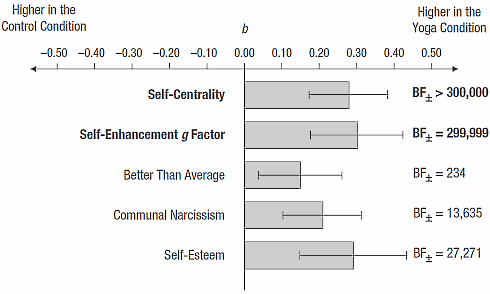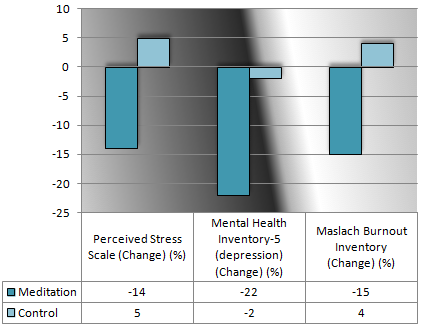|
Yoga and meditation can not push the ego aside
The idea behind yoga and meditation is that these practices enable you to distance yourself from the mechanism in your head that psychologists refer to as 'ego' and that you call 'I'. However, according to German psychologists at the University of Mannheim, yoga and meditation have an opposite effect. In their research, yoga and meditation strengthen the 'I'.
Less ego
The idea behind yoga and meditation is that you learn to see that you are more than what you call 'I'. Your consciousness, and everything that your consciousness is occupied with, is just a piece of yourself. It is a construction, and practicing yoga and meditation learn you how to lower the cerebral energy supply to this construction, allowing you to step outside yourself. Well - outside your 'I', then. The chance that you get Doctor Strange-like abilities is not that great.
This allows you to distance yourself more from your obsessions, your desires and your suffering. By temporarily putting your 'I' on a lower level you can become a better and more harmonious person. That's the idea.
The researchers wondered if it really works like this. An ego is something like herpes: once you have it, it is difficult to get rid of it. Would practitioners of yoga and meditation really be able to disable their 'I'?
Study 1
The Germans followed 93 yoga practitioners for 15 weeks, and during that period they submitted questionnaires several times. Sometimes this happened shortly after the study participants had practiced yoga [Yoga Condition], sometimes if this had not happened for some time [Control Condition].
The yoga sessions gave the study participants a stronger idea of Self-Centrality. Through the sessions they were, in simple terms, more concerned with themselves and less with the world around them.
In addition, the sessions let that the study participants feel better about themselves [Self-Enhancement]. After the sessions, the study participants had a stronger idea that they were doing important things for the world [Communal Narcissism], that they had mastered the yoga techniques better than other practitioners [Better Than Average] - and they had more sense of their own worth [Self-Esteem].

Study 2
The researchers did a similar research in which 162 meditation practitioners cooperated. The researchers followed the study participants for 4 weeks, and asked them several times to complete questionnaires before they had meditated and just afterwards. And in this case too, participants felt better about themselves after meditation.

The researchers asked the study participants whether they were satisfied and happy [Hedonic Well-Being] and whether they had the idea that they were experiencing inner growth and personal development [Eudemonic Well-Being]. The study participants scored higher on these values after the meditative sessions. Using statistics, the researchers discovered that these higher scores were the result of the stronger feelings of Self Enhancement.
Conclusion
"Our findings have broad theoretical significance", the Germans write. "Ego quieting is a central element of yoga philosophy and Buddhism alike. That element, and its presumed implications, requires serious rethinking. Moreover, ego quieting is often called on to explain mind-body practices' well-being benefits."
"In contrast, we observed that mind-body practices boost self-enhancement, and this boost, in turn, elevates well-being. In conclusion, despite claims to the contrary, mind-body practices do not undermine the universality of self-enhancement in self-central domains. The self-centrality principle appears to be an inextricable part of human nature."
Side note
On the website Quartz, journalist Olivia Goldhill published an interesting discussion of the German study. [qz.com, June 17 2018] Goldhil put a question mark over the conclusion of the researchers.
"There is an alternative explanation, though", wrote Goldhill. "It's possible the study participants were doing meditation and yoga wrong. All of the participants were based in Germany, and various academics have theorized that western practitioners of Buddhism fail to practice with an eye towards the selflessness that should characterize the goals of these efforts."
"Though yoga and meditation were originally intended as ways to calm the ego, many non-Buddhist practitioners do these activities with an eye to self-improvement or calming personal anxieties."
Source:
Psychol Sci. 2018 Jun 1:956797618764621. doi: 10.1177/0956797618764621. [Epub ahead of print].
More:
Yoga slows down all types of aging 30.06.2018
Less fatigue due to more hours of yoga 23.06.2018
Boss who does yoga is a nicer boss 14.03.2012
Archives:
Yoga & Meditation
Psychology
|





